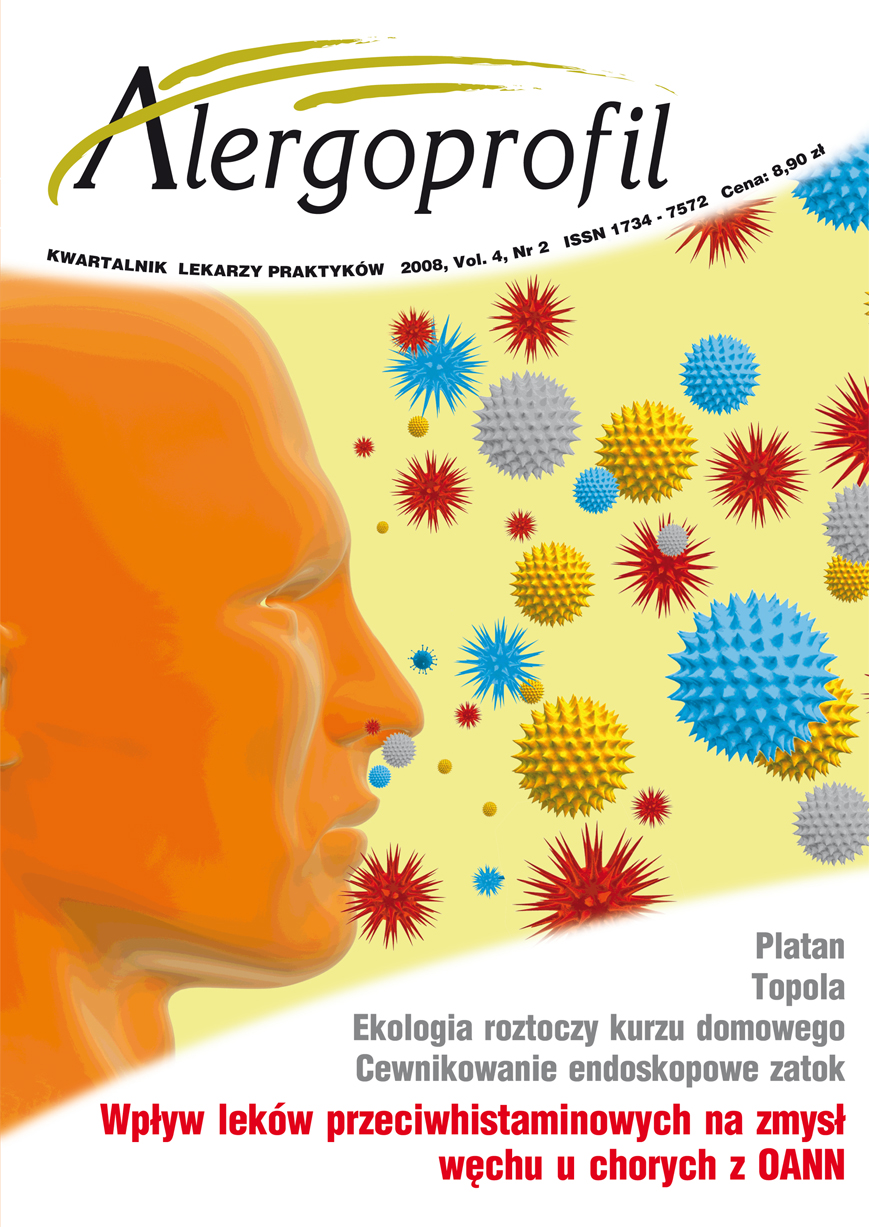The influence of antihistamines on the sense of smell in patients with intermittent allergic rhinitis
Main Article Content
Abstract
The sense of smell is a primal sense for humans as well as animals. Smell allows vertebrates and other organisms with olfactory receptors to identify food, predators, and provides both sensual pleasure as well as warnings danger. The aim of this study is to demonstrate that allergic rhinitis due to alder pollen allergens has an effect on the olfactory system, to assess the new olfactory tests and to investigate the influence of antihistamines on restoration of the function of the olfactory system. The study embraced 173 patients suffering from allergic rhinitis during the period of enhanced exposition to alder pollen allergens. The olfactory system examination was carried out before and after 10 days of treatment with antihistamines. The disturbance of the olfactory system functioning was found in 108 (62,4%) patients with intermittent allergic rhinitis during the period of enhanced exposition to alder pollen allergens. After 10 days of treatment with a nonsedative second generation antihistamine medicine (loratadine or desloratadine or fexofenadine) the improvement in the olfactory system functioning was detected in 58 (75,3%) examined patients. It has been shown that the olfactory marker pen test constructed by the authors is a simple screening test allowing the examination of smell sensibility and the identification of different aromatic substances. The olfactory test based on breath hold phenomenon in the moment of unpleasant odour identification can be a valuable diagnostic tool.
Downloads
Article Details
Copyright: © Medical Education sp. z o.o. This is an Open Access article distributed under the terms of the Attribution-NonCommercial 4.0 International (CC BY-NC 4.0). License (https://creativecommons.org/licenses/by-nc/4.0/), allowing third parties to copy and redistribute the material in any medium or format and to remix, transform, and build upon the material, provided the original work is properly cited and states its license.
Address reprint requests to: Medical Education, Marcin Kuźma (marcin.kuzma@mededu.pl)
References
2. Dżaman K., Jadczak M., Rapiejko P., Syryło A., Jurkiewicz D.: Ocena zależności między funkcjonowaniem zmysłu smaku i powonienia. Pol. Merkuriusz Lek. 2005, 19(111): 280-282.
3. Dżaman K., Jadczak M., Rapiejko P., Emeryk A., Zielnik-Jurkiewicz B.: Taste and smell perception changes in cigarette smokers. Pol. J. Environ. Studies. 2006, 15(2b): 191-195.
4. Rapiejko P., Paczesny D., Emeryk A., Jurkiewicz D.: Temperature and humidity profile in nasal cavity. Pol. J. Environ. Studies. 2006, 15(2a): 665-669.
5. Jadczak M., Dżaman K., Rapiejko P., Jurkiewicz D.: Ocena możliwości leczenia operacyjnego zaburzeń węchu spowodowanych polipami nosa i skrzywieniem przegrody nosowej. Ann. Universit. Marie Curie-Skłodowskiej Sectio D Medicina 2006, 60(supl. XVI, 3): 13-16.
6. Rapiejko P., Dżaman K., Modrzyński M., Lipiec A., Zaręba U., Stankiewicz W., Wojdas A.: Badanie jakości życia pacjentów z alergicznym nieżytem nosa. Ann. Universit. Marie Curie-Skłodowskiej Sectio D Medicina 2005, 60(supl. XVI, 4): 451-455.
7. De Haro J., Benitez P., Alobid I., Gonzalez J.A., Pascual B., Kullol J.: Olfactory alterations in allergic rhinitis to pollen and mites. Acta Otolaringol. Esp. 2008, 59(2): 47-51.
8. Passŕli G.C., Ralli M., Galli J., Calň L., Paludetti G.: How relevant is the impairment of smell for the quality of life in allergic rhinitis? Curr. Opin. Allergy Clin. Immunol. 2008, 8(3): 238-42.

